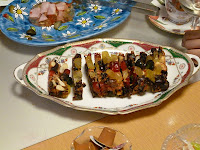This is a blog of many trips to Japan living at our house and doing a home-stay in Kamakura while studying at Japanese language schools in Yokohama, Shinjuku and Shibuya. Also a lot of travelling around Japan.
Wednesday, 30 May 2012
Why is my bed trying to cross the room?
Tuesday morning at 1.32 a rude awakening as a level 5.2 earthquake occurred. A very strange feeling to be awoken from a deep sleep by a moving bed. Things have certainly calmed down since last year but they are still not that calm.
Saturday, 26 May 2012
The Garden
When we bought the house the garden was non-existent. It just just ratty concrete and a few weeds. Each spring and autumn for the last five years I've been planting, heaving and hauling. The garden had to be designed so it could look after itself and only be worked on twice a year. I planted plants that would always be in flower when we were like likely to be there.
The joy of arriving from Australia and racing around the back and seeing dozens of roses in bloom is wonderful. There is a little creek at the back so there is also an extra layer of screening from the houses opposite. Luckily too the sun shines on that side of the house most of the day so flowering plants do well.
Before:
Now:
Saturday, 19 May 2012
WIne tasting Party
 Yesterday, Saturday, I organised I wine tasting for my host family and their friends. it was a big deal for them and one felt that a bit of prestige was riding on how it all turned out. In the end it was a noisy, riotous event.We tried 8 wines from four differnt countries and I cooked some things they probably hadn't seen before .We started at 2 and finished at 7.00 with soba noodles. There is a real thirst for knowledge about wine here.
Yesterday, Saturday, I organised I wine tasting for my host family and their friends. it was a big deal for them and one felt that a bit of prestige was riding on how it all turned out. In the end it was a noisy, riotous event.We tried 8 wines from four differnt countries and I cooked some things they probably hadn't seen before .We started at 2 and finished at 7.00 with soba noodles. There is a real thirst for knowledge about wine here.I cooked Gougeres, stuffed peppers and made some some bread and butter pickles which were a great hit with the chacouterie.
We even had a Ditters gourmet cake transported for the occasion from the Ditters shop in Rundle Mall.
The School and the Course
The School
Below is part of a page from the text book.
2)
この 料理は 少し お酒を ( 入れる )と、おいしく なります。
りょう り すこ さけ い
3)
聖徳太子
しょう とく たい し
8.
聖徳太子は 574年に 奈良で 生まれました。子どもの とき、
しょう とく たい し ねん な ら う こ
勉強が 好きで、馬の 乗り方も 上手で、友達が たくさん いました。
べん きょう す うま の かたじょう ず とも だち
一度に 10人の 人の 話を 聞く ことが できました。
いち ど にん ひとはなし き
20歳に なった とき、国の 政治の 仕事を 始めました。そして
さい くに せい じ し ごと はじ
お寺を 造ったり、日本人を 中国に 送ったり しました。
てら つく に ほん じんちゅう ごく おく
The Language.
The spoken language is quite pleasing to the Western ear. Being polysyllabic and containing a lot of vowels and few hard consonants. It looks when written in Roman script a bit like Italian, with all the a's , i's and e's.The good things about the grammar etc are:
-There are only three irregular verbs.
-There are two past and two present tenses but no future.
-No plural nouns, adjectives or adverbs and no male/female ones, unlike French.
-There are very few exceptions to the rules and the rules are pretty easy to understand.
The bad things are:
-Many words have exactly the same sound, think of two- to -too in English and multiply by about 5 for each sound.
-The word order is almost exactly backwards to English.
-There are many levels of politeness that affects the choice of vocab and the verb endings.
The Writing
This is the really tough bit. The Japanese writing system is widely acknowledged as being the most complex in the world. In any one sentence you can have five distinct things going on:-There is a phonetic alphabet, HIRAGANA (ひらがな), that corresponds to various syllables and is used for Japanese words.
-There is another alphabet, KATAKANA (カタカ), that is different to the above and is used for words derived from foreign languages and sometimes in advertising.
-They occasionally use the Roman alphabet as well.
-Hundreds and hundreds of Chinese, (Kanji), characters are used for the their meaning, each character generally having two distinct pronunciations depending on whether it is in a compound word or not. Compound Kanji tend to be pronounced more as a Chinese person would say them.
-The Kanji characters can also be used phonetically, i.e. for their sound not their meaning. Thus symbol for rice:
is also the symbol for the USA because to early Japanese ears it sounded a bit like the "Ameri" in America.
So you can get all five systems in the one sentence. It can be quite taxing at times, sort of like trying to do a kryptic crossword written in different languages all mixed up.
There are some great derivations and hilarious origins of the Kanji. Also trying to decipher what the English word is that Japanese are trying to write phonetically can provide hours of entertainment. I'll show you some of my favourite Kanji treasures in another post.
Subscribe to:
Comments (Atom)





















